One in five people in the U.S. cannot afford to pay for quality health care — an especially acute challenge for Black and Hispanic Americans, according to a West Health-Gallup poll conducted in March 2021, a year into the COVID-19 pandemic.
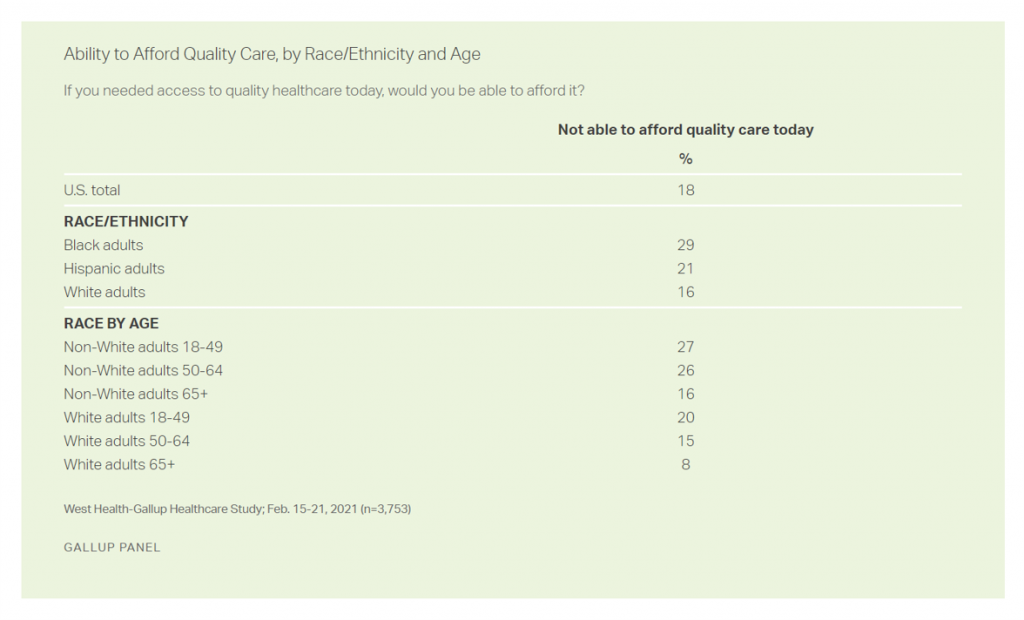
“The cost of healthcare and its potential ramifications continues to serve as a burdensome part of day-to-day life for millions of Americans,” the study summary observed.
Furthermore, “These realities can spill over into other health issues, such as delays in diagnoses of new cancer and associated treatments that are due to forgoing needed care,” the researchers expected.
The first table illustrates the racial/ethnic differences across U.S. adults with respect to peoples’ ability to afford quality health care.
By age, younger Non-White adults have a harder time paying for health care — not a surprise as older Americans 65 and over can access Medicare. Yet there is still a striking 16% versus 8% difference between Non-White versus White U.S. seniors when it comes to affording quality health care.
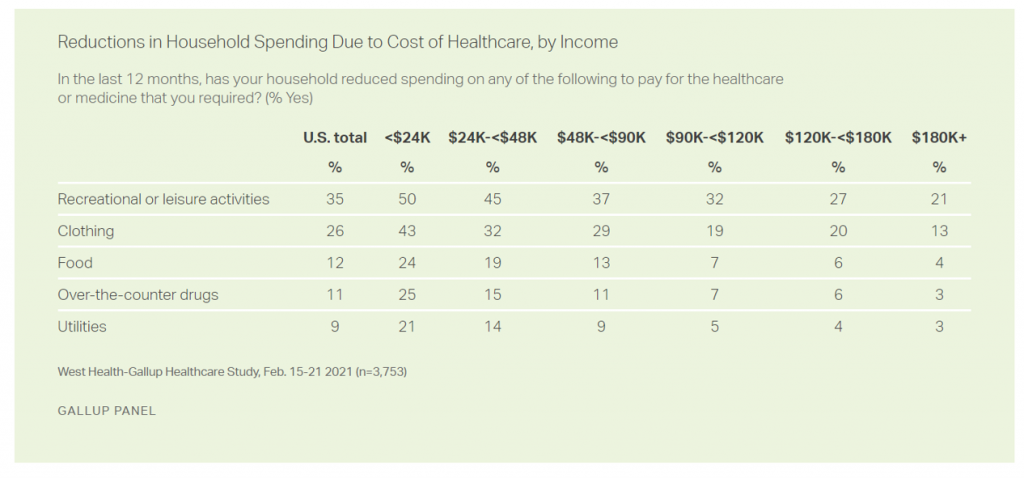 Health care spending for U.S. households can also “crowd out” other spending on stuff like leisure time activities and recreation, clothing, food, and utilities — along with consumer-facing health care products like over-the-counter drugs.
Health care spending for U.S. households can also “crowd out” other spending on stuff like leisure time activities and recreation, clothing, food, and utilities — along with consumer-facing health care products like over-the-counter drugs.
This last chart from the study shows reductions in spending due to the cost of healthcare, by family income. Clearly, people earning lower incomes have less to spend on goods and services. The greater food-cut line item is particularly onerous relative to the role that nutrition plays in peoples’ overall health and well-being. And in the past year of COVID, we have seen that food security has been a toxic side-effect of the pandemic, with more lines at local food pantries and greater food insecurity across the U.S.
Note, too, that even one in five families earning over $ 120,000 a year have cut spending on recreation and clothing in the past year — due to the cost of health care.
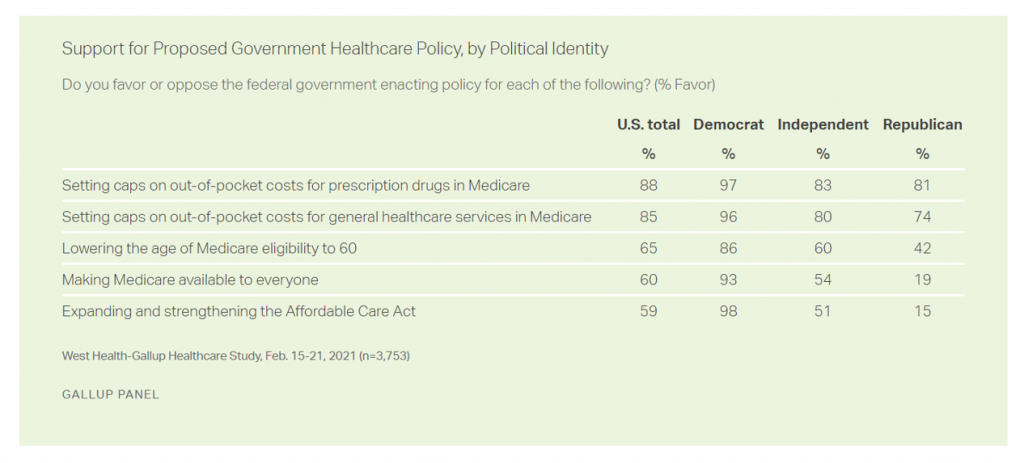
Concerns about health care cost insecurity crosses peoples’ political party identification, the third table illustrates — for some aspects of health reform.
For example, the vast majority of all U.S. adults, cross-party ID, support setting caps on out-of-pocket costs for prescription drugs and general medical services for folks in the Medicare program.
Lowering Medicare age to 60 also garners most Democrats’ and Independents’ support, and 42% of Republicans.
When it comes to “expanding and strengthening the Affordable Care Act, though, that’s a Democrats’ universal objective — supported by nearly 100% of Dems. However, only 15% of Republicans support strengthening the ACA.
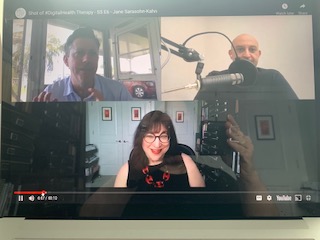 Health Populi’s Hot Points: The publication of this study on 31st March 2021 coincided on the day of my podcast recording with Eugene Borukhovich and Jim Joyce on their Shot of Digital Health Podcast. That’s because our discussion theme was health care consumerism.
Health Populi’s Hot Points: The publication of this study on 31st March 2021 coincided on the day of my podcast recording with Eugene Borukhovich and Jim Joyce on their Shot of Digital Health Podcast. That’s because our discussion theme was health care consumerism.
Eugene, Jim, and I discussed the origins of health care consumerism in the U.S., from growing out-of-pocket costs for prescription drugs to the emergence of value-based payment — where the consumer-facing price of some drugs “should” be free or cheap for meds that treat chronic conditions like diabetes and heart disease — still the top two killers of Americans in 2020, the latest data from the CDC published in JAMA 31st March attested.
We spent some time, as well, discussing the consumer-facing costs of prescription drugs, which will be on the docket for the Biden Administration to address over the coming months. In our chat, I noted that the pharmaceutical industry’s reputation grew quite positive during the pandemic, owing to the fast-development and deployment of vaccines and vaccinations in the U.S.
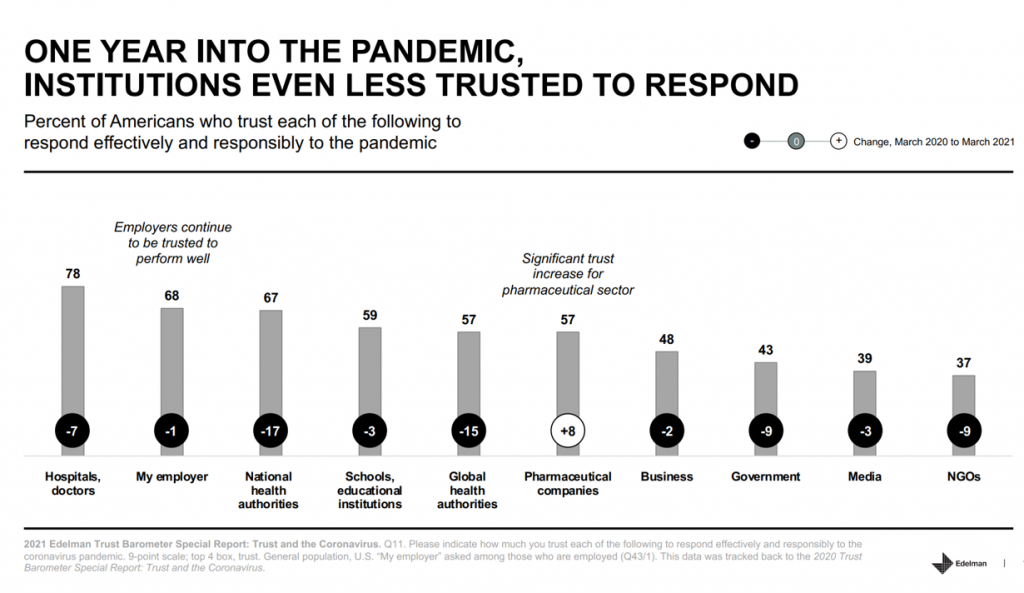 However, this very positive patina could erode as public debate focuses on the price of prescription medicines — an issue on which most Democrats, Independents, and Republicans have concurred for many years.
However, this very positive patina could erode as public debate focuses on the price of prescription medicines — an issue on which most Democrats, Independents, and Republicans have concurred for many years.
Ultimately, patients-as-health-consumers are morphing into health citizens, growing to expect health care as a civil right that also attends to health equity, safety, and data privacy protections.
Please do listen to the podcast, available at this link, to hear more details of our conversation. We covered a lot of ground, all related to the findings and implications of the West Health-Gallup research.
